School funding questions remain as City Charter change takes effect July 1
Jeremy M. Lazarus | 7/1/2018, 10:49 a.m.
“I believe we have six months from July 1 to respond to the charge embedded in the charter change. Rest assured, we will do so. When we have something definitive to say, we will say it.”
That was the official administration response to a Free Press query as to how Mayor Levar M. Stoney would respond to a change to the City Charter regarding school improvement that goes into effect Sunday, July 1.
The change was approved by voters in a referendum last November and approved earlier this year by the General Assembly.
The change requires the mayor to create a fully funded plan to modernize every city school without raising taxes, or to tell the public why he cannot.
Paul Goldman, a political strategist who spearheaded the drive to change the charter, believes more should be done to carry out the legislation.
“This is the first ever Virginia charter law regarding school facilities,” Mr. Goldman said, adding it “has the potential to greatly improve the lives of the city’s students, 90 percent minority and overwhelmingly living in poverty.
“But right now, I’m not sure this historic opportunity, 63 years in the making since the Brown case outlawed government-enforced school segregation and called for improved school facilities, will be seized. I have to be honest, as much as it pains me,” he said.
Mr. Goldman said he would be keeping an eye on how the mayor and City Hall carry out the charter amendment in his new role as special counsel to a General Assembly subcommittee set up to study school building needs and the role the state should play in helping localities address them.
Mayor Stoney opposed the charter change, which won the approval of 85 percent of city voters, saying he could not find the hundreds of millions of dollars that would be needed.
Earlier this year, he pushed through City Council a 1.5 percent increase in the sales tax on restaurant meals and prepared food, with the money raised to be used to pay back $150 million in borrowing for new schools.
The meals tax increase also takes effect Sunday.
At this point, the city and the School Board are planning to borrow only $110 million or so to build three new schools to replace George Mason and Greene Elementary schools and Elkhardt-Thompson Middle School, with no assurances on how the remaining $40 million would be spent.
In late May, the mayor sought to hold discussions within the Educational Compact he has created on school maintenance and improvements, but the meeting was scheduled on a day when at least five City Council members were out of town and two were ill, and the discussion went nowhere.
Council members largely have stayed away from the issue, preferring to follow the mayor’s lead.
When Mayor Stoney proposed slashing $6.7 million from funds earmarked for repairs or maintenance of existing schools, the council agreed, and so did the School Board.
“They could have found the money,” Mr. Goldman stated, either by dipping into the $114 million the city has amassed in savings, by borrowing and repaying $400,000 a year or by eliminating new positions, including a lobbyist the School Board has hired and two employees the mayor is adding to his staff.
“They say the money isn’t there,” he continued, “but the mayor, with council’s approval, put $750,000 into the new budget to finance” the Washington pro football team’s training camp.
So far only one member of City Council, Ellen F. Robertson, 6th District, has introduced legislation that bears on the charter change.
Ms. Robertson’s resolution, which remains on hold, calls on the city’s chief administrative officer, Selena Cuffee-Glenn, to conduct an annual review of “dedicated funding strategies for Richmond Public Schools.” It also calls for Ms. Cuffee-Glenn to provide the mayor, the council and the School Board with recommendations, by Oct. 30 of each year concerning the proposed appropriation for public schools for the following budget year that takes into account projected revenues as well as the “most immediate priorities” for operations, capital improvements, maintenance and other needs.
Ms. Robertson and Council Vice President Cynthia I. Newbille, 7th District, both promised to come up with full funding for public school construction needs by the end of the year.
It is unclear whether the council will approve a measure that could run afoul of state laws and the City Charter, both of which make the School Board responsible for creating a needs-based budget and put the mayor in charge of writing a city budget proposal to send to the council.






